|
We who were working on the Columbia project were aware that the mayor was trying to avoid serious trouble. But, focused as we were on our own agenda, we were completely unaware of the larger picture that was going on in Columbia and Marion County -- the efforts on school desegregation, and the role of the mayor and a key bi-racial group of ministers to bring the black and white communities together to begin talking to each other. Rev. Bill McAtee was one of this group, and this letter, written by him in a state of exhaustion after an intense fortnight of effort, provides a glimpse into that larger picture, filled out much more fully in his 2011 book, Transformed: A White Mississippi Pastor's Journey Into Civil Rights and Beyond.
Because of the exhausting circumstances preceding the original typing of this letter, there were many minor -- but sometimes confusing -- spelling/grammar irregularities, and the bulk of the text was a single multi-page paragraph. That version is available (PDF), but for readability and understandability, this version has eliminated these problems with zero change in meaning. I have also added links to places in my August 9 letter that seem to match what Rev. McAtee is mentioning here from his perspective.
| |
September 2, 1965
[Columbia, Mississippi]
|
|
Dear All,
It seems as though somewhere in the dim past, like about a week ago, I wrote a letter to someone reporting of our school board reversing its decision [that is, it decided to cooperate with desegregation]. This is true. I wrote that letter in a moment of elation over having succeeded in playing a small part in having brought that about. I hesitate to write this letter, for I am again at a point of elation, but I fear at any moment the bottom may drop out again, just like it did last week. However, let me say that by working frantically for seven days for some 15 hours a day, sometimes without eating, several of us have been able to pull a few brands from the burning fire. I write this mainly as an attempt to record this week.
The sequence leading to this week runs something like this.
Back in early July the city school board decided 3-1 not to submit a plan [for desegregation]. There was practically no response whatsoever from the public. In fact, only a few people knew what was going on. Prior to this, the Methodist minister [N.A. Dickson] and I decided to make explorations into the Negro community to set up lines of communication. This we did, and the small group of six ministers (4 Negroes and 2 whites [referred to in this letter, and Rev. McAtee's book "Transformed," as the "6"]) began to meet and talk.
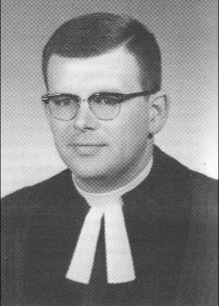
|
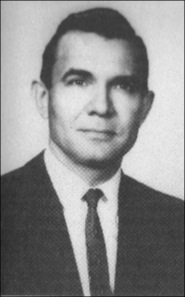
|
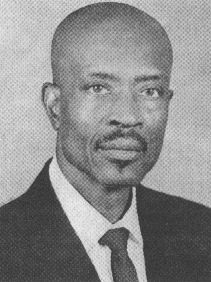
|
Rev. William G. McAtee
Columbia Presbyterian,
May 10, 1964 (day of installation)
(McAtee photo archives)
|
Rev. N.A. Dickson
First United Methodist Church
ca. 1960
(Dickson family archives)
|
Rev. A.G. Payton
Owen Chapel Baptist Church
ca. 1965
|
| |
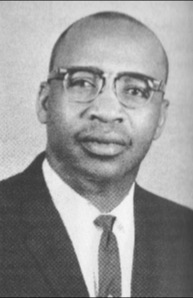
|
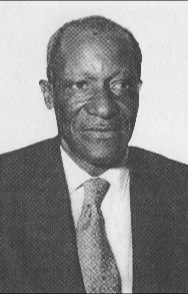
|

|
Rev. L.Z. Blankinship
Friendship Missionary Baptist Church
ca. 1965
|
Rev. I.C. Pittman
First director, Mississippi Rural
Center, Lampton, MS
ca. 1976
(Marion County Historical Society)
|
(One minister
withdrew early on)
|
Real understanding was reached swiftly, so at one point our newly elected mayor, a Presbyterian deacon, met with us. As of today, that meeting was the most significant get together prior to this past weekend. This was the first time the local Negro leaders have had an opportunity to talk freely with an elected official. This is on the gut level now. (That expression takes on a new meaning, for we jokingly say, they may be publicly displayed any day now!)
At a point almost immediately after the school board's decision not to comply, N.A. and I decided the time had come to jostle the white leadership. In a letter to 29 key businessmen, all Methodist and Presbyterian with the exception of two Baptists, we spelled out the alternatives of what to expect in the fall and what must be done to fill the vacuum. On the very night of the day the letters were dropped off in the mail -- a Sunday where we gently prepared the people for what was to come without spelling out details -- a SNCC [Student Nonviolent Coordinating Committee] group rented a house in the "quarters". They were the local FDP [Freedom Democratic Party].
|
The letter received a good hearing, and there was no adverse reaction. To date, not one recipient has said a word to me, and only about 3-4 have said any thing to N.A. The only people whom we had talked with about the letter prior to the mailing was the chairman of the school board, who gave his hearty unofficial approval and the mayor immediately after we put the letters in the mail.
Mayor E.D. "Buddy" McLean
(Marion County Historical Society)
|

(photo: McLean Family Archives)
|
The next event of significance was on August 2, when some 30 to 40 white leaders and 17 Negro leaders met at the invitation of 7 white leaders to hear a presentation of the Community Action Program of the Anti-Poverty Program. Encouragement to this meeting had been given by some who had received the letters from us. This meeting was very successful and a steering committee was announced and selected. They consisted of 5 men, 3 white and 2 Negro (who were in our original group of six). They were appointed by the County Supervisors. An advisory group of 25-30 or more people volunteered to help when needed.
I was away from the city from July 20 to August 13. During this time the SNCC group worked within certain bounds and conferred with the mayor on their moves. During this period they tested a couple of restaurants, the theater [failure and success] and the library, all without incident. The mayor vouched for them to receive books, and his mother the librarian even fined a CR [civil rights] worker 2¢ for an overdue!
Up to August 13, the CR workers were somewhat baffled at the community. They were not running up against the stereotypical southern town. At this point, the plot thickens. Two CR workers [actually just local kids] were detected as shoplifting, but were not picked up until later. (The accounts vary as to the discretion used in the pick-up). They never denied the charges, but contended that the wrong two were picked up and would not reveal the identity of the real ones. So on about the 13th their trial came up. Just about the time the thing was to wind up the sheriff comes in with some petty charges of tearing up screens in the jail and the like. This was the first stereotypical reaction the CR had seen and were waiting for. They walked out unannounced to a cafe where Klan type people hang out and demanded to be served as a protest to the action of the sheriff. It came off without incident.
On August 19 the local paper came out with a front page editorial call for leadership. It was very good. Also there was a full page ad with five statements of belief listed and some 150 names attached [actually 136], all leaders in business, city aldermen, county supervisors. Only a couple Main Street businessmen did not sign -- 2 druggists and one grocery man who runs the store where shoplifting took place. There was some rumble about this edition of the paper, but nothing to reverse the statement of beliefs. They stated they would abide by the law until it was declared unconstitutional; leave law enforcement to officers and asked others to do likewise; did not condone punishing those with whom disagree as individuals, and if happens, should be prosecuted, duly; discourage gathering of citizens to view "events"; approve actions of elected officials and asked others to do likewise
On Saturday, August 21, the CR workers, some outsiders and a few locals, began to picket the Sunflower food store, demanding a public apology for false arrest, the hiring of one falsely accused of shoplifting, and a few of the other regular demands. This picketing continued through the following week on about 4 occasions.
On August 23, I met with one of the Negro ministers of our group to catch up on the time I was away. While I was away this man and N.A. had helped the mayor work out some ground rules with the CR group for their activities -- avoiding busy times of day, limiting their activities to certain places, in certain numbers. On August 23, he and I set a tentative time for our whole group of six to meet and re-cap the summer. That meeting was to have been today, and it won't come off. It not needed. It seems ages since we set that meeting, it was only 10 days ago.
On August 26, at the picket line, the CR group decided that to be more effective they had to block the door. The mayor had a verbal exchange with one of the leaders, a white girl. He asked her to back up and not block the door. She refused. He tried to bluff by saying "I'll have to arrest you," and she said, "OK." He declined.
(This was the Thursday I was so elated on the school board's having changed their decision. On Tuesday, August 24, they had a meeting to reconsider their position. Health, Education, Welfare, gave them one more chance and another deadline. Things had changed somewhat from the first time they had come to a decision. A state referendum had struck down constitutional amendments on voting rights, our town had gone 3-1 for striking down, other school boards in the state had voted to comply, including our county, the public statement of beliefs had been printed, pressure generated from our letter had built up on the one board member who had led the fight to not comply. He had made some public statements inconsistent with official action, in hopes of getting pressure off. The board meeting was a rounder ending in a 2-2 vote, making it possible for the chairman to break the tie in favor of submitting a plan.) This was Tuesday, now to Friday.
On Friday [August 27], N.A. and I were on standby for a call from the mayor. On Thursday he had called the Community Relations Service in Washington, to have their area man, Draper, come see him immediately. (In June, and I had been introduced to Mac Secrest in Washington by Epps over the phone. I had called him once since that time and had visited with him in Washington while on vacation. The mayor called him.) Friday morning, N.A., Draper, the mayor and myself had a long session over the situation. We began to set up a meeting of some 150 white leaders who were willing to sit down and face facts. A Fed team from Washington would help. Then after lunch, Draper, N.A. and I, met with our "6" to set up a similar meeting with the Negroes. Out of these two meetings it was hoped a third meeting would come where representatives from both sides could sit down and talk. Late in the afternoon we checked back with mayor and found that the picketing had been uneventful. But that NAACP official had been bombed in Natchez [NAACP President George Metcalf's car was bombed that day]. (At this point I am leaving out scads of details and decisions made.)
N.A. and I went well into the night evaluating and brainstorming about next steps. N.A. and I stood by all Saturday morning to see what was needed of us. Around noon, the mayor called telling me that things have gotten worse at the picket line. They refuse to not block the door (blocking of the door is a fuzzy thing to define.) and he was going to arrest them. This is Saturday. Remember what Saturday is like in a southern town. He wanted me to inform the leaders of what he was having to do and why. He had spent the morning trying to effect a compromise [not clear whether this relates to the mayor's "ground rules" notes], but to no avail. I got a group together -- part of our "6" -- and spent a great length of time with them. We were constantly trying to determine the effect this arrest might have on our planned meeting. (By the way, the large group of whites were to meet on Friday, Sept 3, and the Negroes on Sept 4.) They assured the mayor they were still behind him even though he was forced to act.
While we were conferring, things were developing downtown. As we found out later, the local leader was not producing, so a hardcore head was sent in later. [This was a misconception -- project director Curt Styles was off on a mission, and Louis Ashley from Bogolusa had been working with us.]. As the arresting began, he managed not to cross the chalk line, and so didn't get arrested. He immediately demanded police protection, which was refused. The group went limp and had to be carried off. A couple hundred spectators had gathered, including the local Baptist preacher, laughing it up on the front line at all this fun! Anyway, the mayor had ordered the police not to manhandle any of the arrestees, but a county deputy jumped in and started roughing one up. The mayor then jumped in and pulled the deputy off himself. The deputy was emotionally out of control. But finally, the area was cleared without further incident.
By this time I had looped by and gotten N.A. and we went back to the home of one of our "6" [Rev. A.G. Payton]. He lived close to the Freedom House.
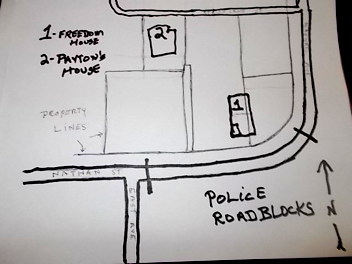
Rev. McAtee's diagram
|

As they are in present day
|
(I forgot that on July 31, the Freedom House was fired on with some 15 shots and set fire. It was put out.) We were briefing him on latest developments when he mentioned his oldest son had been in the group he thought that had been arrested! Boy at that point, I was not sure what to expect next, thank goodness [as in: "things have gotten this bad, it may be better to not know how much worse they could get"].
Anyway we looped by town. It was dark and raining by then. Things were quiet. I spoke with the mayor at his home or somewhere, I believe by phone. He said he was making headway with the local kids in jail, but was still not getting through to the outsiders [i.e., CR people, perhaps specifically organizer Louis Ashley]. He then informed me that the guy who had carefully not stepped across the line [Louis Ashley] had asked for a parade permit for Sunday afternoon at 3. Four busloads of CR workers were converging, and he had notified CBS, all networks and the stage was set. The permit was granted and route outlined.
At this point I could own tell only N.A. The mayor and I talked about the necessity of getting a hard core of white and negro leaders to stand with him figuratively in case of an extreme emergency. He was getting some rumble and lipservice from the 150. Not that they were against him, but they had not reached the point of literally standing by him. He had notified FBI, Highway Patrol, local police about plans for Sunday and that was all. Wanted to keep it quiet to avoid a crowd. Late Saturday night I conferred with one of the Negro leaders and briefed him, getting clearly established in his mind we needed a hardcore group that would stick with us.
Looking back, here is how the events of late Saturday and Sunday morning developed. The mayor went down to request Highway Patrol support, only to learn that there was only one car in the whole district. They were all in Natchez. That morning there had been an announcement on TV calling for a big Klan rally with Robert Shelton. Finally, with this as a handle, the Highway Patrol pulled out 27 units and sent them to Columbia. Up to now, and as late as one that afternoon, there was no build up downtown. But when 27 cars rolled up at City Hall, the traffic picked up.
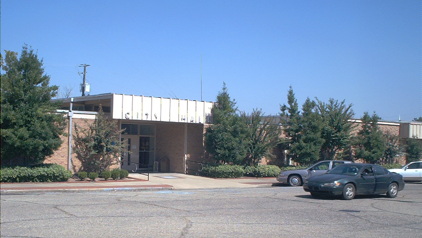 Columbia City Hall today (photo courtesy Rev. Bill McAtee)
Columbia City Hall today (photo courtesy Rev. Bill McAtee)
|
At that briefing, the FBI reported they had reason to believe that some 300 Deacons for Defense were also coming. He also told the mayor at some point that the guy who had refused to be arrested was on their list and was under surveillance as a communist. (THIS IS QT) [In his book Transformed, Rev. McAtee explains this last by "At the time, the surveillance activities and credibility of the FBI were neither questioned nor verified."] He pointed out that not all the CR movement was infiltrated, but the area in the Natchez-Laurel-Bogalusa triangle was! The Highway Patrol were ordered to shoot first, because the Deacons and Klan were going to shoot then ask questions This is not known publicly now or will be. But into this situation, good ole Columbianites gathered to watch the show. Thank goodness only 9 marchers [the mayor's notes said 12] showed up for this tough agitator. He didn't produce.
|

|
Late Sunday afternoon, the black side of "6" was to meet to come up with their list of 150 for the meeting planned for next Saturday. All along through this we were dealing with immediate issues and trying to keep our previous plans in tact. The mayor asked to get our group together. (Backing way up, one of the first things "6" did in June was to get the "4" [black ministers] to compile a list of 15 local Negroes who were real leaders. So its this 4 plus 15 that the mayor wanted to meet with him on Monday at 9:30. We got signals crossed, having to work so fast, and by Monday only our 4 had been notified. At any rate, I asked them to pull together as many of the 15 as they could in 30 minutes. This group was to meet with a like number of white leaders. We decided that N.A. and I would give our seats to those who were not informed.
This we explained to our counterparts in "6". They were interested in learning that the status of the white minister is different from them when it comes to these matters. At any rate, they met and it was one of the most fruitful meeting to date. The mayor laid the cards on the table and brought everyone up to date. For the first time there was a free exchange of ideas, not glossing over the bad or the impossible. The mayor was criticized some from the white side for his frankness but by and large he continued to build support. That afternoon, Mayor met with 30 business people (white) and informed them of what was going on.
Then at 4 he had to sit as judge at city court [for the trial of the arrested picketers]. It met for four hours. Had a real sharp federal attorney who was more than kind to the mayor, who was no legal eagle. At any rate, he fined the kids minimum and made it possible for them not to go back to jail, also suspended sentence. The Fed lawyer said this was the first time he had ever heard a white Southerner talk like our mayor, and complimented him and told the kids he was bending over backward.
So Monday night was another long night of reevaluation. We had made some mistakes and had some fences to mend, but in the heat of things had made some wise decisions.
Tuesday was a day to re-group and take soundings as to whether it was feasible to continue with mass meetings planned for the weekend. (At this point I pulled away some to get set up at church for the beginning of weekday kindergarten.)
Tuesday was sort of a low day emotionally. I was fearing the meeting might be called off. The support of Negro community was high, and I was afraid of losing this. But the mayor found growing support over the need for bi-racial talks, but disagreement over how to bring this about. Also, there was a growing distaste for having Feds come talk to whites at this point. We had had the Negro invitation done for their meeting (N.A. and I ran them off), and the other 4 were to have envelopes addressed and waiting for the word go.
On Wednesday morning, Sept 1, we scheduled a meeting of "6" to re-evaluate and plan for weekend meeting. By now the Mayor was convinced these two meetings must go on. He wanted to get the most people informed and involved, not just the old power structure. That morning meeting with "6" was the best yet. We have reached a deep fellowship unequalled before as far as I'm concerned. We are under constant danger, for we can see ourselves being watched, but these Negro men have taught me the meaning of living without crippling fear. Also, we received the word about Monday that there was a strong possibility that the mayor's, N.A.'s, and my lines are tapped. This is producing a problem in communication, but we are working through this. There are thousands of incidentals which again I say are left out but have been most interesting.
So on Wednesday afternoon, I got the go ahead from the mayor to invite a list of 169 white leaders to meet Friday night. We have added some more women to the list. The happy thing that came from the morning meeting with "6" is that they are more interested in hearing what local leaders are saying than Feds. We have set up methods of choosing representatives from these two weekend meetings to sit down together. Next week right now seems like next year. Yesterday afternoon, N.A. and I got out the invitations, so with both sets mailed we feel a momentary relief.
As we were stuffing those invites yesterday we began to see how we were actually changing the political structure of this county. I intend to see that our good friend in the high level of state gov't. who we all want to run for governor gets to know "6". They can hand him that segment of the vote in this county, after seeing them operate. [Rev. McAtee explains that this "referred to William Winter. He lost in his first run for governor not long after I wrote this, but later in the early 1980s he was successful. Winter mentioned later to me in a conversation the support he got from Buddy and others in Columbia."] Which brings me back to the sequence of events.
On the weekend there were announcements in Negro pulpits regarding the march. Yesterday at "6" we were informed in so many words that the announcements were made but editorialized on. They said there could have been several hundred showing up, but evidently through the leadership of our group they squelched it. On Tuesday, the local leader of the CR workers [Curt Styles], who had been circumvented by that hot-shot, was back in control. The other guy had not produced. The first leader met again with the mayor and they agreed on certain ground rules for picketing again.
I have not been out of the office this morning to find out the latest developments. It's Thursday again and we have to face another weekend. Our two meeting now must succeed, or who knows what will happen then.
Please be discreet in sharing this. I did want to let you in on my activities. Frank, pass your copy on to Jack. Bill, show your copy to Goody Koontz. I want to send one to Epps -- Frank, what is his address? You guys, I would appreciate your taking time out from your busy schedule to write me. I'll try to answer in the next lull to bring you up to date. I did want to commit this much to writing. Also is a letter enclosed that I found time to write to our friend, the writer, in Indiana.
Remember the phone being bugged now, Frank, when you call.
Tiredly, Bill McAtee
[The following are handwritten notes appended on the last page.]
|
Sept 3:
|
7:30. Whites met 150 plus (12 women) = excellent response -- out in the open, things said never dreamed of hearing -- supported mayor -- willing to serve -- Feds there --
|
|
Sept 4:
|
Negro -- 160 plus -- excellent meeting -- 12 elected-- (CR group left town)
|
|
Sept 23:
|
"24" met -- excellent response -- key young Negro -- job -- CAP, immediate -- N.A. on "24"
|
|
Sept 15:
|
3 to have entered 2nd grade but declined, Presbyterian was to have been teacher --
|
|
Sept 25:
|
4 pickets at Sunflower. no problem.
|
|
Sept 24:
|
exchange with Chas. Otis = leave for Akron.
|
|
Sept 27:
|
confer with chairman and "24" with N.A.
|
[The following Statement of Beliefs, referred to above, was put in the local paper -- and signed --
by 136 civic leaders: businessmen (all but 3 on Main Street signed), city aldermen and county supervisors.
It was accompanied by a front-page editorial in support of it and the signers.]
THE COLUMBIA PROGRESS
Thursday, August 19, 1965
Section Two -- Page 7
STATEMENT OF BELIEFS
We the undersigned hereby pledge ourselves to the following:
|
1.
|
Although we may not approve of all the laws now being enacted by our National Government, we shall abide by these laws unless they are declared unconstitutional by our duly authorized courts.
|
|
2.
|
We shall leave law enforcement to our law enforcement officers and we urge and insist that all men do likewise.
|
|
3.
|
We do not condone the action of private citizens of either race who propose themselves to be the law. We insist that any person or group who assumes the role of punishing those with whom he or they disagree shall be found and punished to the maximum for their crime.
|
|
4.
|
We discourage the gathering of our citizens to view events that they consider distasteful and we urge all persons to refrain from such action.
|
|
5.
|
We approve the actions of our elected local officials; we intend to obey the law and we humbly and prayerfully urge all men to do likewise.
|
|

(click to enlarge)
|
| |
|













